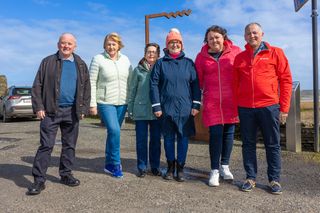10 ways to boost your memory
It's use it or lose it when it comes to our capacity for recollection.
Most people look but don't see, they listen but they don't hear, they touch and they don't feel . . . they talk and they don't think
It is easily forgotten but memory is an essential part of who and what we are. Without our recollections, all the colour would drain from our lives. The world would seem very different to us.
"In a very real sense you are the sum of your memories," says Charles Garavan, founder of the Dublin-based Memory Academy. "Your entire sense of identity, and to some extent your personality, is bound up with, if not entirely based on, your experiences. Your memories are what make you you. When people lose their memories for events and people who are important to them, to a very real extent they lose part of themselves."
This is an important point as, in an age of iPhones and Twitter and ubiquitous technology, it can feel as if memory is overrated. With the entirety of human knowledge literally at our fingertips, what's the point in remembering anything but the most basic information? Is it not better to allow our mobile phones and iPads to do our mental heavy lifting for us? Can we outsource our memory rather than cramming our cranium with trivia?
"By not using our brains to retain certain types of information, we will simply get worse at remembering that type of information," says Garavan. "That might not be important as regards phone numbers, but if we were to externalise all our knowledge it would have implications for how well we were able to retain, and use, knowledge."
You should also bear in mind that memory isn't a single mental process. We remember different things in different ways, and if we wish to improve our powers of recollection we need to go about it in a holistic fashion.
"Memory for a person's name, for example, is entirely different from memory for other facts about a person," says Garavan. "That is why you can recognise a person and know who they are, why you know them, who you have in common, where they work, etc, but not be able to remember what they are called."
So we're agreed that, far from an irrelevance in the smartphone era, memory is more important than ever. How do we boost it? Here are some useful tips.
1 Drink -- but not too much
There is some evidence that modest -- and we do stress modest -- alcohol consumption boosts memory. Researchers in France found that people aged 65 or over who consumed up to two glasses of wine daily were 45pc less likely to develop Alzheimer's.
It may be that the benefits are specific to red wine -- it is theorised that resveratrol, one of the 'flavonoids' in red wine, improves the health of blood vessels and thus helps blood flow to the brain.
2 Picture it
We retain certain kinds of information more easily by committing them to memory as images rather than words. For instance, if you have parked your car in row eight, try to imagine eight green bottles on a wall. The image will stay with you longer than the more abstract number.
3 Set A Target
"I would suggest you start by setting a specific and measurable goal rather than a general one," says Charles Garavan. "Instead of wanting your memory to get indefinably better, decide that you want to know the names of all the people in your office by January 31, or to learn 1,000 new words of foreign language vocabulary by then."
4 Use All your senses
If you can involve as many senses as possible when trying to file a piece of information on your internal hard drive, you have a better chance of recollecting it later. So if you are introduced to someone and want to remember their name, offer a handshake, and look them in the eye.
"Leonardo da Vinci said the best way to use your brain is to employ all your senses," memory expert Tony Buzan told the Irish Independent recently. "Most people look but don't see, they listen but they don't hear, they touch and they don't feel . . . they talk and they don't think.
"When you reverse that -- you look and you see, you touch and you feel -- the memory really grows. This is the way to meet people. You become socially more popular. Others understand that you care because you are interested -- you remember their names and so forth."
5 Pay Attention
We've all misplaced something then blamed our memory when we couldn't find it. In fact, this has little to do with memory -- it's a question of engaging fully with the world around you.
"Losing keys, glasses, etc, are much more likely to be failures of attention than memory," says Garavan. "You simply didn't notice where you put them in the first place, so you couldn't possibly remember."
6 Stay Healthy
The better your physical condition, the faster the figurative wheels will turn in your brain. Conversely, if you are overweight and sedentary, your thought processes will be more sluggish.
"When you are fit, especially in the cardiovascular sense, your heart works better, your blood works better," according to Buzan. "It is akin to a Formula One car. If there is good petrol in the body, then your brain is better powered. If you are using low-grade fuel it goes more slowly and breaks down."
7 Break it down
Few of us can remember a long string of digits. However, when we break the number up into a series of small numbers it is easily recalled. That, after all, is how we remember our ATM passwords and our phone numbers.
The same principle applies to any piece of information. If you can break it down into smaller 'chunks', you will be better able to absorb it and 'summon' it at a later date.
8 Take care of your mental health
Long-term stress, anxiety and depression can damage the areas of the brain that retain information. It is believed that depression raises the level of the hormone cortisol in the bloodstream and, thus, the brain.
This is thought to impair the cognitive process and to be especially damaging to short-term memory. Moreover, if you are depressed you may tend to focus on negative memories, meaning you are more likely to forget a 'positive' item of information, such as a spouse's birthday.
9 Move Your eyes up and down
Granted it might attract curious stares on the bus but, according to a study in the journal 'Brain and Cognition', moving the eyes up and down for 30 seconds could boost short-term memory by 10pc.
"This type of eye movement may help both sides of your brain communicate better by activating the neural pathways that allow them to 'talk' to each other, which is necessary for retrieving memories," said the author of the research.
10 Mix It up
There is no 'one' way to boost memory. So experiment with several of the techniques outlined above, such as visual association, sensory recollection and the breaking down of large chunks of data into something more manageable.
"Try different strategies to improve your memory and measure how they work for you -- but focusing on the
idea that the more you use the information or test yourself on it, the better it will be stored in memory," says Garavan.
"If you were learning a language this might mean using your new vocabulary in sentences whenever you can, or making up flash cards with the English word on one side and the foreign word on the other, or working with someone else who will test you on the vocabulary."
Join the Irish Independent WhatsApp channel
Stay up to date with all the latest news














